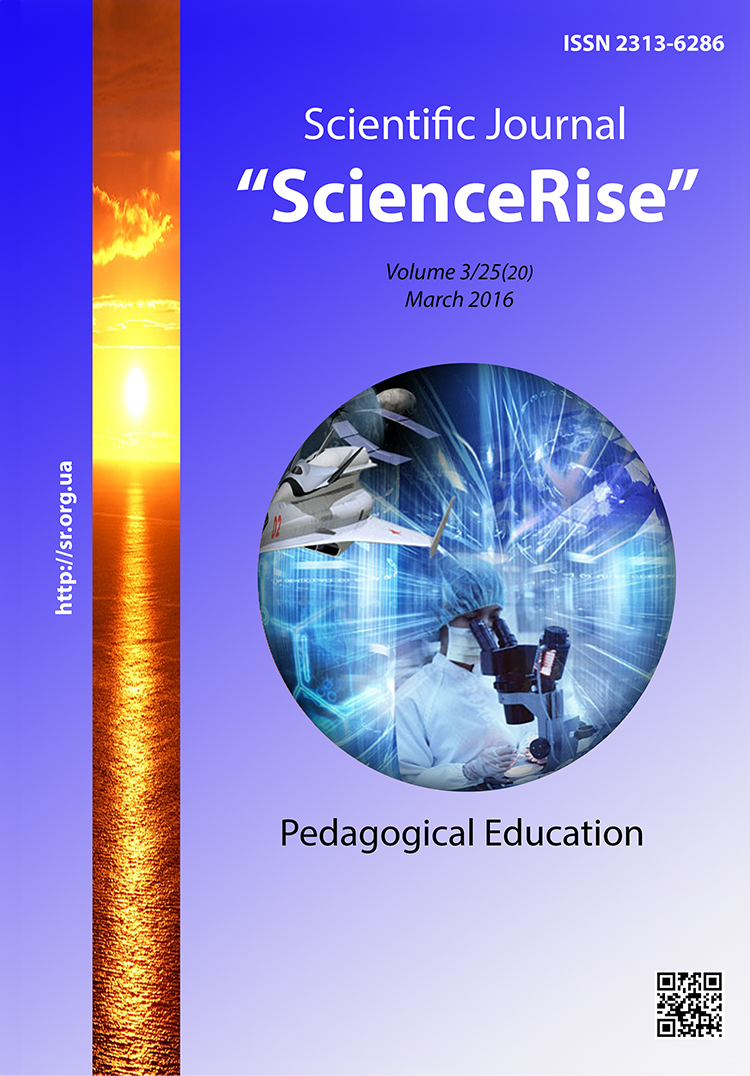Social and cultural principles in modern science and educational technologies of physical culture
DOI:
https://doi.org/10.15587/2313-8416.2016.63515Keywords:
high education, specialists of physical education, anthropic educational technologies, creativity, socializationAbstract
The modern model of high education presupposes the training of person able to creation and perception of changes. In this connection in the sphere of high physical education social and cultural principle must become the node one.The task of research is elucidation of anthropic educational technologies built on the principles of active, sociocultural approaches in pedagogical sphere of physical culture and sport.
For realization of set task was used the complex of interconnected theoretical methods of scientific research (analysis, synthesis, comparison, generalization of scientific sources) that allow affirm that humanitarian essence of education, its direction on the high professional, spiritual-value and general cultural development of student’s personality must be the main principle of innovations in sphere of high pedagogical system.
There was determined that in future specialists of physical education sphere must be developed the need for creative work, understanding of necessity and social conditionality of creative attitude to its professional activity that is formation of specialist-professional able to humanitarian thinking and creative activity
References
Vasyljuk, V. M., Jarmoshhuk, O. O. (2014). Znachennja rozvytku kreatyvnosti jak akmeologichnoi' invarianty profesionalizmu majbutn'ogo fahivcja z fizychnoi' kul'tury. Naukovi pedagogichni problemy fizychnoi' kul'tury, 12 (53), 17–20.
Verbickij, A. (1991). Aktivnoe obuchenie v vysshej shkole. Moscow, 208.
Dychkivs'ka, I. M. (2004). Innovacijni pedagogichni tehnologii'. Kyiv: Akademvydav, 352.
Tymoshenko, O. V. (2008). Optymizacija profesijnoi' pidgotovky majbutnih uchyteliv fizychnoi' kul'tury. Kyiv: vyd-vo NPU imeni M. P. Dragomanova, 420.
Shyjan, B. M., Papusha, V. G. (2005). Metodyka vykladannja sportyvno-pedagogichnyh dyscyplin u vyshhyh navchal'nyh zakladah fizychnogo vyhovannja i sportu. Kharkiv: «OVS», 208.
Shestakov, M. P. (2000). Shtuchnyj intelekt u sportyvnij nauci XXI stolittja. Teorija i praktyka fizychnoi' kul'tury, 7, 8–13.
Canuel, R. Why do we need innovation in education? (2012). Canadian Education Association. Available at: http://www.cea-ace.ca/blog/ron-canuel/2012/11/3/why-do-we-need-innovation-education
Neumajer, O. (2013). Innovation in education and innovative learning activities with ICT. Information and Communication Technology in Education. Proceedings. Ostrava: Ostravska univerzita v Ostravě, 207–212.
Bobrov, A. V. (1999). Pol'ova koncepcija mehanizmu svidomosti. Svidomist' i fizychna real'nist', 4 (3), 47–59.
Natale, G. G., Kozlovcev, V. Je. (2002). Strategija rozvytku fizychnoi' kul'tury i paradygma synergetyky. Teorija i praktyka fizychnoi' kul'tury, 4, 2–11.
Dons'kyj, D. D., Dmytrijev, S. V. (1999). Psyhosemantychni mehanizmy upravlinnja ruhovymy dijamy ljudyny. Teorija i praktyka fizychnoi' kul'tury, 9, 2–6.
Downloads
Published
Issue
Section
License
Copyright (c) 2016 Василь Миколайович Василюк, Олена Олександрівна Ярмощук

This work is licensed under a Creative Commons Attribution 4.0 International License.
Our journal abides by the Creative Commons CC BY copyright rights and permissions for open access journals.
Authors, who are published in this journal, agree to the following conditions:
1. The authors reserve the right to authorship of the work and pass the first publication right of this work to the journal under the terms of a Creative Commons CC BY, which allows others to freely distribute the published research with the obligatory reference to the authors of the original work and the first publication of the work in this journal.
2. The authors have the right to conclude separate supplement agreements that relate to non-exclusive work distribution in the form in which it has been published by the journal (for example, to upload the work to the online storage of the journal or publish it as part of a monograph), provided that the reference to the first publication of the work in this journal is included.

